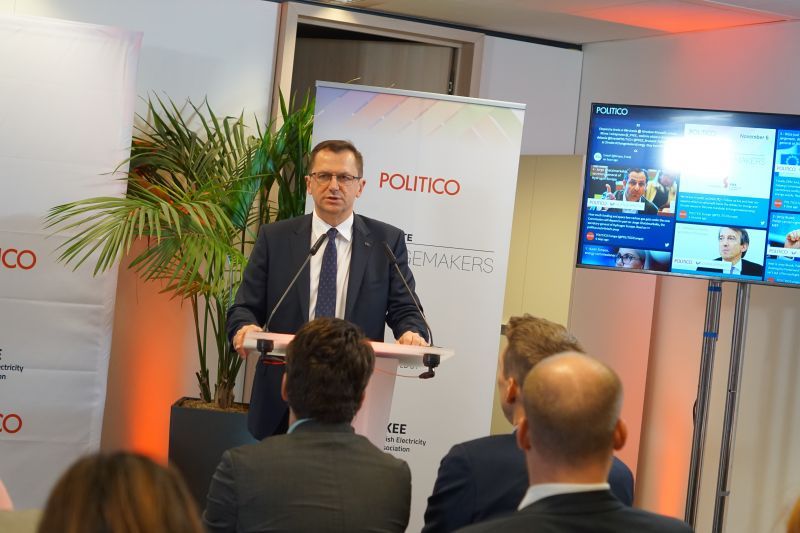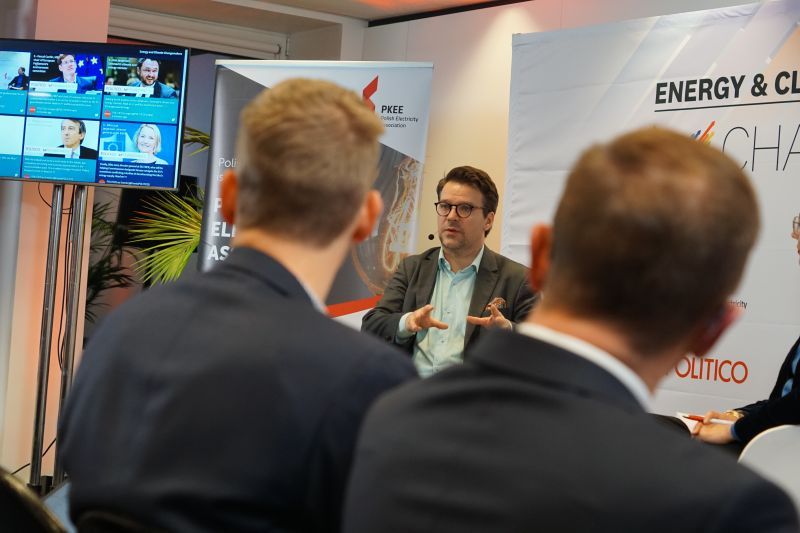„The “Energy & Climate Changemakers” event was organised by Politico with the support of the Polish Electricity Association (PKEE). The meeting, attended by MEP Ville Niinistö and Mirosław Kowalik, President of Enea and Vice-president of the PKEE, took place in Brussels on the 6th of November 2019. Member of the European Parliament and Miroslaw Kowalik, CEO of Enea and Vice President of PKEE, held on 6 November 2019 in Brussels.
The members of the PKEE are following the global trends of renewable energy development
President Mirosław Kowalik in his speech opening the “Energy & Climate Changemakers” event pointed out that energy transition is a process planned for decades, which requires a stable legal framework and, most importantly, a number of financial support instruments. - The goals of the EU energy and climate policy should be the engine driving the European economy, not its brakes. This is why it is important to develop a plan for the implementation of the EU 2050 Long-term energy strategy. The plan has to take into account the different starting points of the Member States and also provide for dedicated funds for the transformation of the energy sector - he added. The objectives of the EU's energy and climate policy should drive the European economy, not hinder it. This is why it is so important to draw up an implementation plan for the EU's long-term strategy up to 2050, which will take into account the different starting points of the Member States, as well as providing for dedicated resources for the transformation of the energy sector. - he added.
According to PKEE’s Vice-president, the modernisation of the energy sector requires long-term investments; this is why already today the renewable energy sources are an important element of the strategies of companies that are members of the Association. - The responsible low-carbon transition is one in which renewable and conventional energy sources complement each other. Therefore, in mid-October, the Enea Group established cooperation with the National Support Centre for Agriculture on the development of photovoltaics in Poland. As a result of the agreement, large-scale solar farms will be built on agricultural land belonging to the Centre. Enea also produces electricity from wind and water. In the first half of this year, the Group noted a 12% increase in production from renewable sources - he explained. A responsible low-carbon transition is one in which renewable and conventional energy sources complement each other. Therefore, In mid-October, Enea Group commenced cooperation with the National Support Centre for Agriculture with regard to the development of photovoltaics in Poland. As a result of the signed agreement, on the agricultural property belonging to the Centre large-scale photovoltaic farms will be built. Enea also produces electricity from water and wind. In the first half of this year, the Group recorded a 12 per cent increase in production from renewable sources- he explained.
MEP Niinistö talks about the energy and climate challenges
Ville Niinistö, Member of the European Parliament and the coordinator of the Greens in the ITRE Committee noted that the Green Deal should be the foundation for conducting a broad reform of the European economy. - Without a doubt, it will require investments and financial outlays. Nevertheless, we must remember that this is about our future because these will be investments in the real economy, jobs and in increasing productivity throughout the European Union. Moreover, I believe that the Green Deal must concern a sustainable and ecological transformation that will cover not only the economic but also social issues. Then we will succeed - he said. This will undoubtedly require investment and financial outlay. However, we must remember that this is about our future because it will be an investment in the real economy, in jobs and in increased productivity throughout the European Union. Furthermore, I believe that the Green Deal must be about a sustainable and ecological transformation that covers not only economic but also social issues. Then we will be successful – he pointed out.
DOWNLOAD FILES




